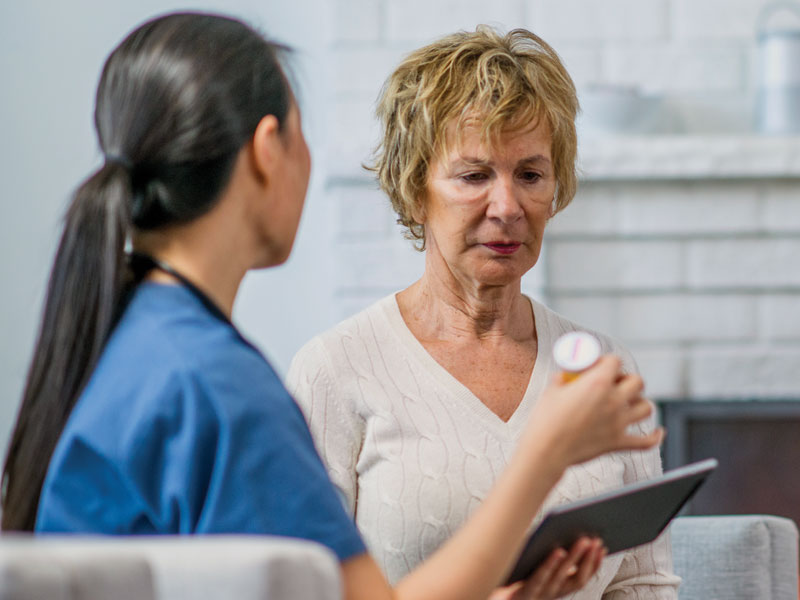Innovative Programs Help Institution Grow Its Own Nursing Workforce
Nursing shortages and high rates of turnover are documented problems that negatively affect patient care and institutional costs. During a session for the inaugural ONS Bridge™ virtual conference, Christopher Brooks, MS, RN, CENP, AOCNS®, director of nursing professional development and education at Memorial Sloan Kettering Cancer Center, outlined philosophies and programs his institution uses to recruit and retain its nursing workforce.
Nurse Innovators Develop Processes to Combat Common Oncologic Emergencies
Oncologic emergencies require prompt intervention to achieve the best outcomes. During a session for the inaugural ONS Bridge™ virtual conference, oncology nurse innovators described their projects to develop standard protocols to manage two common oncologic emergencies: hypersensitivity reactions to rituximab and febrile neutropenia.
- Read more about Nurse Innovators Develop Processes to Combat Common Oncologic Emergencies
- Add new comment
Communication Is Essential to End-of-Life Choices
Only 17% of all patients surveyed have had conversations with their physicians about the end of life, experts reported. Nurses can help normalize the process of dying and facilitate such conversations.
Use Evidence-Based Strategies for Managing Central Venous Catheters
Understanding evidence-based strategies for the management and administration of central venous catheters is crucial to the prevention of associated complications, MiKaela Olsen, DNP, APRN-CNS, AOCNS®, FAAN, said in a presentation for the inaugural ONS Bridge™ virtual conference. Oncology nurses need to be knowledgeable about vascular access to prevent complications and ensure optimal outcomes for patients.
Advanced Practice Nurses Are at the Heart of Patient Care in Cardio-Oncology
Cardiovascular disease and cancer, the two leading causes of mortality worldwide, share risk factors that have a direct impact on patient care and survival. During a session for the inaugural ONS Bridge™ virtual conference, Anecita P. Fadol, PhD, APRN, FAANP, FAAN, of the University of Texas MD Anderson Cancer Center, discussed what advanced practice nurses need to know about the evolving specialty of cardio-oncology to improve patient outcomes.
- Read more about Advanced Practice Nurses Are at the Heart of Patient Care in Cardio-Oncology
- Add new comment
Nurses Help Patients Weather the Storm of CAR T-Cell Therapy
Chimeric antigen receptor (CAR) T-cell therapy is at the forefront of care for a specific subset of patients with cancer. However, the severe side effects of this highly specialized treatment require unique management. During a session for the inaugural ONS Bridge™ virtual conference, Kathleen McDermott, RN, BSN, OCN®, BMTCN®, of Dana-Farber Cancer Institute, discussed how oncology nurses can temper the storm of CAR T-cell therapy.
What Is a Genomic Variant?

The Human Genome Project determined the DNA sequence (order of base pairs) of the entire human genome. Humans are 99.9% identical at the level of base pair ordering, but the 0.1% difference contributes to disease risk. Upon completion of the human genetic blueprint, research turned to identifying and cataloguing genomic variation as well as determining the clinical relevance of variants.
Medications That Affect Microbiome May Influence Checkpoint Inhibitory Response

Common classes of non-cancer medications that affect a patient’s microbiome are associated with increased or decreased survival with immune checkpoint inhibitor drugs, researchers reported in study findings published in BMC Cancer.
- Read more about Medications That Affect Microbiome May Influence Checkpoint Inhibitory Response
- Add new comment
Opioids Can Be Used Safely for Cancer-Related Pain
During the current opioid epidemic, a safe, balanced approach to pain management is imperative. In an ONS Bridge presentation, Jeannine M. Brant, PhD, APRN, AOCN®, FAAN, discussed the use of opioids in patients with cancer.





